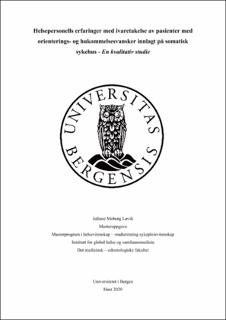Helsepersonells erfaringer med ivaretakelse av pasienter med orienterings- og hukommelsesvansker innlagt på somatisk sykehus - En kvalitativ studie
Master thesis
Permanent lenke
https://hdl.handle.net/11250/2720484Utgivelsesdato
2020-12-18Metadata
Vis full innførselSamlinger
Sammendrag
Bakgrunn: Personer med orienterings- og hukommelsesvansker har større risiko for delirium, opplever oftere fall, og har høyere dødelighet enn andre grupper innlagt på sykehus. Hensikt: Å utforske hvordan helsepersonell erfarer å ivareta pasienter med orienterings- og hukommelsesvansker innlagt på somatisk sykehus. Metode: Studien anvender et kvalitativt, beskrivende design. Fem semistrukturerte, individuelle intervju og et fokusgruppeintervju med helsepersonell og sykepleiestudenter på sykehuset ble gjennomført. Intervjuene ble tatt opp på lydopptak, transkribert og analysert ved hjelp av Malteruds systematisk tekstkondensering. Resultater: Studiens deltakere rapporterte at sykehuset som sted var en barriere for ivaretakelse av pasienter med orienterings- og hukommelsesvansker. De beskrev en bekymring for pasientenes helse og sikkerhet hvor en fleksibel tilnærming var nødvendig. Dette kunne medføre dilemmaer mellom standardisert behandling relatert til innleggelsesårsak og individuelle behov. Begrensninger i kommunikasjon med pasientene gav behov for kontakt med pårørende og kommunehelsetjenesten for innhenting av informasjon. Deltakerne opplevde at personalet på sykehuset uttrykte negative holdninger i forhold til å ivareta eldre med kognitiv svikt og hadde manglende kunnskap i utøvelse av demensomsorg i en sykehuskontekst. Konklusjon: Studiens funn kan tyde på at det er behov for endringer i det fysiske miljøet for å skape et tryggere miljø og enklere navigering for pasienter med orienterings- og hukommelsesvansker. Det vil være behov for økt fokus, mer kunnskap og en holdningsendring blant personalet, samt nye og bedre rutiner for samarbeid med pasienter, pårørende og kommunehelsetjenesten. Nøkkelord: Demens, sykehus, omsorg, helsepersonells erfaringer Background: People with orientation and memory difficulties faces a greater risk of developing delirium, experience more falls and have a greater mortality rate than other groups admitted to hospitals. Aim: To explore how health professionals experience caring for patients with orientation and memory difficulties admitted to a somatic hospital. Method: A qualitative, descriptive design were used in this study. Five semi-structured individual interviews and a focus group interview with health care professionals and nursing students at the hospital were conducted. The interviews were audio-taped, transcribed and analysed using systematic text condensation. Results: The study participants reported that the hospital as a place was a barrier to caring for patients with orientation and memory difficulties. They described a concern for the patients’ health and safety where a flexible approach was needed. This could lead to dilemmas between standardized treatment related to the reason for admission and individual needs. Limitations in communication with patients necessitated contact with relatives and the municipal health services to obtain information. The participants experienced that the staff expressed negative attitudes in relation to caring for the elderly with cognitive impairment and had a lack of knowledge in the practice of dementia care in a hospital context. Conclusion: The findings may indicate that there is a need for changes in the physical environment in order to create a safer environment and easier navigation for patients with orientation and memory difficulties. There is a need for increased focus, more knowledge and a change in attitude among staff, as well as new and better routines for collaboration with patients, relatives and the municipal health service. Keywords: Dementia, hospital, care, health care professionals’ experiences
